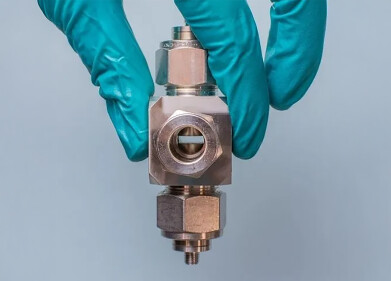Analytical Instrumentation
How to Take Off Safely with New Refractometers
Oct 27 2014
Ice and jet fuel: a dangerous combination. On cold winter days and at high altitudes excess water present in jet fuel will freeze and can lead to accidents. How can this be avoided?
The capacity of jet fuel to hold water diminishes at cruising altitude, where the temperature is around -50 °C. Separating water from the fuel may freeze in fuel lines or filters, thereby blocking the flow of fuel and shutting down the engine. One possibility to prevent this is the addition of fuel system icing inhibitors to jet fuel, such as diethylene glycol monomethyl ether (DiEGME). They are mandatory in military aircraft fuels and used in commercial civil aviation fuels depending on routes, flight lengths and season. The addition of 0.10 % to 0.15 % DiEGME, for example, lowers the freezing point of water to -43 °C.
But how can this concentration be controlled in order to ensure a safe flight? Abbemat refractometers from Anton Paar determine the concentration of DiEGME in aviation fuels according to the international ASTM standard D5006. The Abbemat refractometers directly show %Vol of DiEGME and are fully automatic and user-independent. Take off safely with the Anton Paar refractometers.
Digital Edition
PIN 25.5 Oct/Nov 2024
November 2024
Analytical Instrumentation - Picturing Viscosity – How Can a Viscometer or a Rheometer Benefit You? - Sustainable Grease Formulations: Evaluating Key Performance Parameters and Testing Method...
View all digital editions
Events
Nov 27 2024 Istanbul, Turkey
Biogas Convention & Trade Fair 2024
Nov 27 2024 Hanover, Germany
Dec 03 2024 Dusseldorf, Germany
Dec 08 2024 Anaheim, CA, USA
Turkey & Black Sea Oil and Gas
Dec 11 2024 Istanbul, Turkey



















